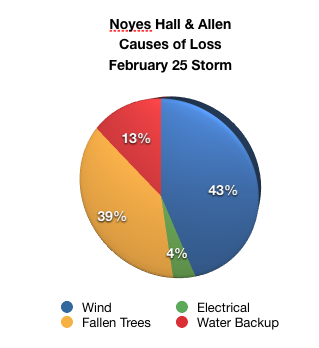For the second time in a month, The National Flood Insurance Program lapsed on March 28 due to lack of continued federal funding. The Senate left for Easter recess until April 12 without addressing HR4851, which would have offered an extension. This leaves anyone looking to buy Maine flood insurance – or in any other state – high and dry, in the height of flood season.
If You’re Buying a Home and Need Flood Insurance
Flood insurance servicing companies are collecting applications, but cannot accept them or bind coverage until the NFIP is re-authorized by the Senate. If your lender requires proof of flood insurance, this may delay your closing. Talk to your lender for more information. You literally can not buy flood coverage without an act of Congress.
If You Already Have Flood Insurance, and Need to Make a Claim
Claim payments will be continued as usual for all policies currently in effect.
If You Have Flood Insurance and Need to Increase Your Coverage
Coverage cannot be increased on existing policies until the NFIP is reauthorized. This may delay a loan closing if you are refinancing or taking out a home equity loan.
If Your Flood Policy is About to Renew
Renewal policies can not be issued during the lapse. Many companies sent renewal bills prior to March 28. If you received a bill and paid it, your coverage should be in force. If your premium was not paid before March 28, coverage cannot be bound until after the NFIP is reauthorized by Congress.
What You Can Do
The NFIP is the only primary flood insurance available for residential properties. Many insurers have a servicing contract to issue business on behalf of the NFIP, but it is a government program. Without reauthorization, the program is essentially shut down. Call or email your senator to let them know what this lack of funding means to you. While there’s no guarantee, the NFIP reauthorization will likely be retroactive to March 28 – once it’s finally passed. That’s usually what happens in these cases.
Even during normal operation, the National Flood Insurance Program operates differently than most insurance programs. There are waiting periods and underwriting rules and requirements that are unique to this program. It’s impossible to advise you about your individual situation with a blog post like this. Call a Maine homeowners insurance agent for advice about your own insurance.
UPDATE:
As of April 15, 2009, Congress passed, and the President signed into law, a bill reauthorizing the National Flood Insurance Program (NFIP) until May 31, 2010. The extension included retroactive funding to cover two gaps in the program (March 1 – 2 and March 29 – April 15, 2010). The program will expire again on May 31 unless it is further extended. Stand by!





